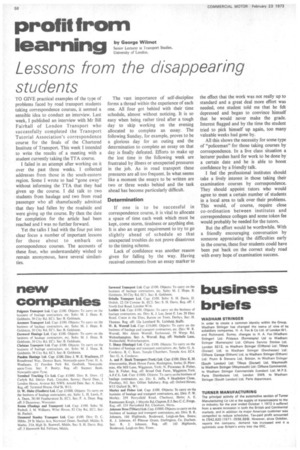profit from learning
Page 58

If you've noticed an error in this article please click here to report it so we can fix it.
by George Wilmot
Senior Lecturer in Transport Studies, University of London.
Lessons from the disappearing students
TO GIVE practical examples of the type of problems faced by road transport students taking correspondence courses, it seemed a sensible idea to conduct an interview. Last week, I published an interview with Mr Bill Fairhall of London Transport who successfully completed the Transport Tutorial Association's correspondence course for the finals of the Chartered Institute of Transport. This week I intended to write the results of a meeting with a student currently taking the TTA course.
I failed in an attempt after working on it over the past three weeks. I collected addresses from those in the south-eastern region. Some I wrote to had "gone away" without informing the TTA that they had given up the course. I did talk to two students from haulage and two from road passenger who all shamefacedly admitted that they had fallen by the roadside and were giving up the course. By then the date for completion for the article had been reached and I was no further forward.
Yet the talks I had with the four put into clear focus a number of important lessons for those about to embark on correspondence courses. The accounts of these four, who understandably wished to remain anonymous, have several similarities. The vast importance of self-discipline forms a thread within the experience of each one. All four got behind with their time schedule, almost without noticing. It is so easy when being rather tired after a tough day to skip working on the evening allocated to complete an essay. The following Sunday, for example, proves to be a glorious day for an outing and the determination to complete an essay on that day is finally defeated. Efforts to make up the lost time in the following week are frustrated by illness or unexpected pressures in the job. As in road transport these pressures are all too frequent. In what seems like a moment the essays to be written are two or three weeks behind and the task ahead has become particularly difficult.
Detennination
If one is to be successful in correspondence course, it is vital to allocate a space of time each week which must be kept, come storm, tiredness or anything else. It is also an urgent requirement to try to go slightly ahead of schedule so that unexpected troubles do not prove disastrous to the timing scheme.
Lack of confidence was another reason given for falling by the way. Having received comments from an essay marker to the effect that the work was not really up to standard and a great deal more effort was needed, one student told me that he felt depressed and began to convince himself that he would never make the grade. Interest flagged and by the time the student tried to pick himself up again, too many valuable weeks had gone by.
All this shows the necessity for some type of "policeman" for those taking courses by correspondence. In a live class situation a lecturer pushes hard for work to be done by a certain date and he is able to boost confidence by a friendly talk.
I feel the professional institutes should take a lively interest in those taking their examination courses by correspondence. They should appoint tutors who would agree to meet a certain number of students in a local area to talk over their problems. This would, of course, require close co-ordination between institutes and correspondence colleges and some token fee would probably be needed for the tutors.
But the effort would be worthwhile. With a friendly encouraging conversation by someone appreciating the difficulties early in the course, these four students could have been put back on the correct study road with every hope of examination success.
































































































